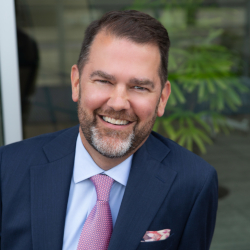Financial Advisor – Part Advisor, Part Counsellor, Part Coach
Oct 01, 2017
 When I first started in this profession, I thought I had a good idea of what it meant to be a financial advisor. An advisor had to develop a strong understanding of the investment world, become reasonably well-versed in the tax rules, understand the nuances of life insurance products, and be able to articulate all of these details in a language a client could understand. But, little did I know how these factors are really just the initial building blocks to becoming a good financial advisor.
When I first started in this profession, I thought I had a good idea of what it meant to be a financial advisor. An advisor had to develop a strong understanding of the investment world, become reasonably well-versed in the tax rules, understand the nuances of life insurance products, and be able to articulate all of these details in a language a client could understand. But, little did I know how these factors are really just the initial building blocks to becoming a good financial advisor. With youthful exuberance and a fair bit of naivety, we all start our planning careers with vim and vigour… to provide all the financial advice we can, to as many people as possible. And yes, eventually life and wisdom gain the time needed to bring reality to the fore.
In many instances, clients have a ‘normal’ progression of life… individuals meet and marry sweethearts… children arrive… homes are bought… education is saved for… bigger homes are needed… businesses thrive… children graduate, head off to university, and move out… grandchildren arrive… retirement begins… parents die… and so goes the circle of life. However, as often as this progression happens, there are as many instances where life’s curveballs change the progression… illnesses, divorces, job losses, business failures, pre-mature deaths, etc. I truly believe it is in these times where what we do has much more meaning than money.
When someone has gone through tragedy in their lives, when asked how they are doing they often answer with “I’m fine.” It was suggested to me that in these circumstances “fine” is an acronym for Fearful, Insecure, Neurotic, and Exhausted! I’ve since suggested this to grieving clients and they have unanimously replied this was correct. From there, I learned to simply ask them to tell me about how they are feeling… then just listen.
Tears are very common in a financial advisor’s office. They come for all different reasons, but they all have meaning. The trick is finding out if/how/where money may be a factor. More often than not, money factors are only interesting, but otherwise irrelevant to the situation.
These are the times when our financial IQ is not as important as our emotional “EQ”. This is where we become more of a counsellor, who just happens to understand money. Frankly, this type of ‘education’ for us is mainly done on the fly… the more experience we have, the better advisors we become. This does not mean we have personally dealt with these curveballs, but in our role we have a front-row seat to our client’s lives. We are able to see what has worked, and what has not, which allows us to be able to pass along useful advice.
No one typically writes textbooks about how best to financially get through life’s curveballs. Simply put, in these situations your stomach is likely going to dictate direction more than a textbook answer. This is true about most of what we do as advisors; it is a fairly consistent conversation between the textbook answer and one’s stomach. If it does not feel right, there are often other things for us to consider. Yes, sometimes one has to step out of the comfort zone to be directed down the 'right path', but the stomach should not be totally ignored. It is in these instances where we become more of a counsellor than a financial advisor.
This can be extended to suggest we often become part marriage counsellor as well. It is safe to say, as advisors we have had a front-row seat to some reasonably heated marital ‘disagreements’ in our offices, and money was not always involved. The first time it happens can feel a bit awkward, but it gets easier and I have found with experience (including in my own marriage) you learn to be a good referee. Often financial disagreements are a function of misunderstanding and/or simply need a disinterested third party to create the right discussion.
But before I leave you thinking our roles as advisors are glum and/or constantly on edge, there are just as many opportunities to cheer a client’s successes. Yes, one of our main roles is to help clients save for life’s "Need-to-Do's", and navigate the curveballs, but we also get to enjoy helping clients achieve the "Nice-to-Do" goals, the fun stuff.
A couple once arrived and told me they bought a nice new couch last week because they knew they were seeing me this week. Since when did we become no fun?! Just because I’m a financial advisor doesn’t mean I’m here to take away someone’s opportunity to have fun with life. Some of the most enjoyable work is helping people find ways to afford the fun stuff… recreational properties, golf memberships, the hot convertible… and to do it without compromising the "Need-to-Do" goals.
It is all about finding balance. If you are in your early-60’s and you realize you could have retired a year earlier, but you had to work an extra year to afford that golf membership you bought at age 40, will you really care? Of course not! Frankly, you’ll be glad you did because the previous 20 years gave you the ability to enjoy the experience and develop friendships that make retirement that much more fruitful.
It is situations like these that make us more of a life coach than a financial advisor. It is not uncommon for my financial review meetings with retired clients to be 45 minutes of discussing life, and only 15 minutes discussing money. Affording a retirement is often the ‘easy part’. The hard part is defining what a retiree is going to do with themselves and their newfound free time. I have heard it called the 1000-hour question.
Generally speaking, we work 2000 hours each year… 40 hours per week, for 50 weeks per year. It is relatively easy to fill 1000 hours of time each year with the things we want to do, but it is much harder to fill the second 1000 hours of time with things of substance… things that get you out of bed in the morning with some level of interest and excitement… things that give you a sense of value. This is where our ability to be a life coach can be very valuable.
What drives a person to retirement is not the people or the work, it’s the pace. As soon as people are able to slow down the pace, they’re happy to keep working for a number of years longer. Thus, they simply cut their 2000 hour work-year down to 1000 hours per year, which gives them the freedom to enjoy the things they want, while keeping a strong sense of value and purpose through their week.
Regardless of the situation, relationship, or experiences, I can say without hesitation that it is a real honour to be invited to into my clients’ lives. We know clients share many thoughts, feelings, or pieces of information that are not shared with their closest friends. We take this very seriously and respect this. We know your trust and confidence in us is earned, and we intend to do nothing but improve this with you in the years ahead.
You might also be interested in...
Estate Planning Misconceptions
In this 5-minute webinar, we explore an important but often misunderstood area of financial planning.
Learn More
Popular Categories
Search Insights
Book a meeting
Schedule a meeting with an RGF Advisor.







